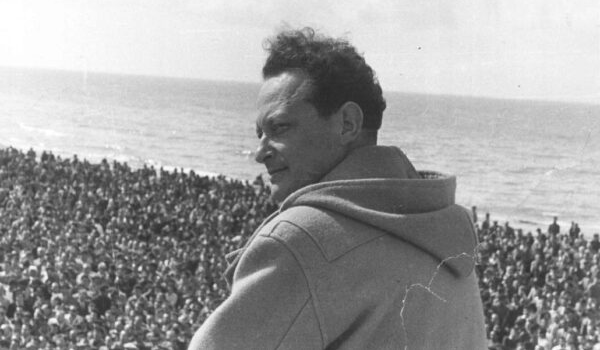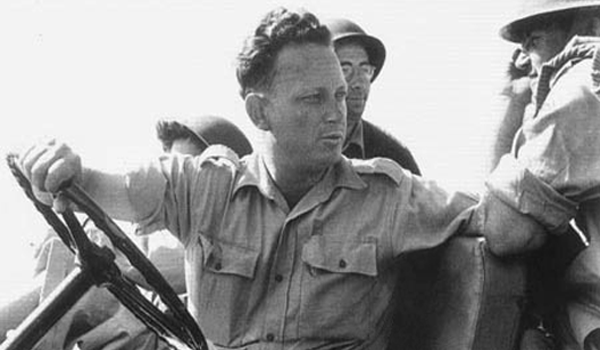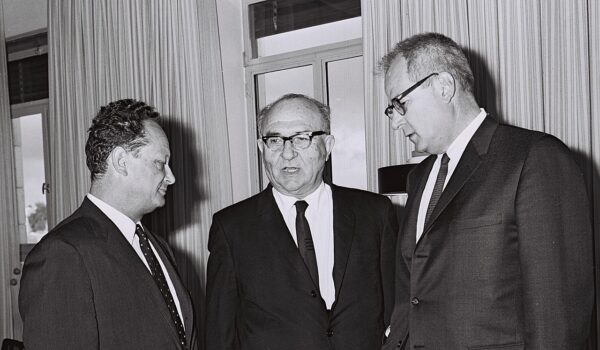Yigal Allon (1918-1980)



Yigal Allon (1918-1980)
Yigal Allon was born in KfarTavor. When Yigal was five years old, his mother passed away, and his older brothers went on their own paths. Yigal, the youngest child, remained with his father. The area of KfarTavor was isolated and had to cope with daily raids and thefts by neighboring Arab and Bedouin communities. When Yigal reached age 13, and a Bar mitzvah was held, his father gave him a gun and sent him to protect farm crops from thieves.
In 1934, aged 16, Yigal began learning in Kadoorie Agricultural High School, where he first admitted to the ideals of the Labor movement with its Socialist and Zionist base. It was in school when Allon became aware that his education from home was very poor and limited in relation to his classmates from urban areas. His teachers came with the attitude of expanding his horizons and encouraging him to close gaps in his education relative to other classmates. In his autobiography, Allon glorified the school director, and regarded him as an outstanding educator, claiming he taught him human and social values.
After graduating from Kadoorie Agricultural High School in 1937, Allon became one of the founders of Kibbutz Ginosar. Military career
Allon joined Haganah in 1931 and went on to command a field unit and then a mobile patrol in northern Palestine during the 1936–1939 Arab revolt in Palestine. During the revolt, while working on the fields and farms of the Kibbutz, Allon was summoned to take a position of command in the Haganah by Yitzhak Sadeh. After completing a squad command course, Allon was appointed to the command of the Mobile Guards. Allon took part in the expulsion of Arabs who immigrated with their flocks to the Jewish fields. He also became known for the ambushes he planned for gangs that infiltrated the settlements.
During this period, he participated in several operations of the Special Night Squads (SNS) under the command of Orde Charles Wingate and Bala Bredin. In 1941 he became one of the founding members of the Palmach. In 1941 and 1942, he was a scout with the British forces who fought in Syria and Lebanon. In 1945; he became Commander in Chief of the Palmach.
On 22 June 1948, at the climax of David Ben-Gurion‘s confrontation with the Irgun over the distribution of weapons from the Altalena, Allon commanded the troops that were ordered to shell the vessel.
During the 1948 Arab–Israeli War, Allon led several of the major operations on all three fronts, including Yiftach in the Galilee, Danny in the center, Yoav, and Horev in the Negev. His last major military roles as commander were in October and December 1948: Operation Yoav towards the Hebron Hills and Operation Horev along the Southern Egyptian Front. As Operational Commander of the Southern Command he was responsible for security along the borders with Egypt and parts of Jordan. On 4 June 1949, he declared an 8 kilometres (5 mi) wide closed military zone along the border.
On 18 October 1949, while he was in an official visit in Paris, Allon was told by his French hosts that Ben Gurion had decided to replace Allon as OC Southern Command and appointed Moshe Dayan in his place. Most of Allon’s staff officers resigned in protest.. He retired from active service in 1950.
political career[edit] In January 1948, Allon helped form the left-wing Mapam party. However, after the 1948 war, Prime Minister David Ben-Gurion told Allon to dissociate himself from the party, a rival of his own governing Mapai party, as he saw it as too left-wing and a threat to state security.[12] In December 1948, Mapam co-leader Meir Ya’ari criticized Allon’s use of tens of thousands of Palestinian refugees to achieve strategic goals.[13]
In 1950–1952, he studied philosophy and history at St Antony’s College, Oxford.[14] After ending his military career, Allon embarked on a public political career. He became a prominent leader in Ahdut HaAvoda, which had split from Mapam in 1954, and was first elected to the Knesset in 1955, where he served until his death. He was a member of the Economic Affairs Committee, Constitution, Law and Justice Committee, Education and Culture Committee, Joint Committee on the Motion for the Agenda Regarding Sports in Israel, and the Foreign Affairs and Defense Committee.
Allon served as the Minister of Labour from 1961 to 1968. In this role he worked to improve the state employment service, extend the road network, and fought to get legislation on labor relations passed. From 1968 to 1969 he served as the Deputy Prime Minister and Minister of Immigrant Absorption. Allon served briefly as interim Prime Minister following the death of Levi Eshkol on 26 February 1969. He held office until 17 March 1969, when Golda Meir took over after being elected leader of the Labor Party. He became the Deputy Prime Minister and Minister of Education and Culture in Meir’s government, and served in that post until 1974. During the September 1970 crisis in Jordan he advocated supporting King Hussein in his conflict with the PLO.
In 1974 he was a part of the delegation to the Separation of Forces Agreement. He became the Minister of Foreign Affairs in 1974 and held this post until 1977.[16][17] At the time of his sudden death in 1980, he was a candidate for the leadership of the Alignment, challenging the incumbent party head Shimon Peres.
Allon was the architect of the Allon Plan, a proposal to end Israeli occupation of parts of the West Bank with a negotiated partition of territories.
The plan was presented to the cabinet in July 1967, right after the Six-Day War. According to the plan, Israel would retain one-third of the West Bank and protect itself from invasion from the east by a strip of settlements and military installations along the Jordan Valley. The mountain ridge west of this strip, which was populated by Arabs, would be confederated with Jordan. A strip of land flanking the Jericho-Jerusalem road, Gush Etzion and a large part of the Hebron Hills area, would be annexed. Minor territorial changes would be made along the Green Line, specifically in the area of Latrun. Allon also called for the development of Jewish neighborhoods in east Jerusalem, the rehabilitation of the Old City’s Jewish Quarter, and the annexation of Gaza, whose Arab inhabitants would be resettled elsewhere.[19]
Death and commemoration[edit
Allon died of heart failure in Afulaon 29 February 1980. He was buried on the shore of Sea of Galilee in the cemetery of Kibbutz Ginosar (Kibbutz Ginosar Cemetery) in the Northern District. The funeral was attended by tens of thousands of mourners, with condolences extended by many world leaders, including Egyptian president Anwar Sadat.
Explaining the growing admiration for Yigal Allon three decades after his death, Oren Dagan of the Society for the Preservation of Israel Heritage Sites said, “people wish to live in the kind of state Yigal Allon dreamed of, for example on the Arab-Jewish issue. This isn’t a post-Zionist approach, neither hesitant nor apologetic. It’s an approach of safety and security that says, ‘Our place is here,’ but still emphasizes the importance of dialogue, and never through condescension or arrogance. Allon extended a hand in peace, and that’s the approach we want leaders to adopt today.”
1936-39 Commander of one of the field units of the Haganah Commander of a regiment in the Field Corps
1941 One of the founders of the Palmach
1943-45 Deputy Commander of the Palmach
1945-48 Commander of the Palmach
1948-49 Appointed Lieut.-Gen.; commanded forces in decisive battles during the War of Independence
1950 Retired from the IDF
1954 Became one of the leaders of Ahdut Haavodah
1955 Elected to the Knesset
1961-67 Minister of Labor
1967-69 Deputy Prime Minister and Minister of Immigrant Absorption
1969-74 Deputy Prime Minister and Minister of Education and Culture Member of the Ministerial Committee on Security and Economy
1974 Member of the Israeli delegation to the separation-of-forces agreements with Egypt and Syria
1974 Deputy Prime Minister and Minister of Education and Culture
1974-77 Minister of Foreign Affairs
1977-80 Member of the Knesset Committee on Foreign Affairs and Security Chairman of the Knesset Sub-committee on Lebanon
1978-80 Chairman of the World Labor Zionist movement
1979 Instrumental in the establishment of Takam, the United Kibbutz Movement
https://www.gov.il/en/departments/people/yigal-alon
Yigal Allon (Peikowitz)
was born on October 10, 1918, in the village of Tavor (Masha), to his parents Chaya and Reuven Peikovich, who were among the settlers of Rosh Pina and the founders of Kfar Tavor. From childhood, Yigal worked on his father's farm and was aware of the colony's guarding and security issues. These two foundations, of work and security, have left a deep imprint on his entire life.
Studied in the first year of the "Kadoorie" agricultural school. After graduating in 1937, he joined the Gar'in that established Kibbutz Ginosar.
The days of the 1936-1939 events and the Homa and Migdal settlements. Served together with Moshe Dayan, under the command of Yitzhak Sadeh, as commanders of the security force for the settlers who came to Hanita.
Was the commander of the Hagana's commander course in Jowhara and the instructor for the officers' course at Yavne'el. In the same year he married Ruth.
In 1941, with the establishment of the Palmach, Yigal was appointed commander of Company A. He commanded a patrol unit that instructed the way to Syria from Metula and Marj-Iyun, as an aid to the British army that attacked Syria and Lebanon. In 1942 founded the Palmach's Mista'arvim unit and was its commander. In 1943 he was appointed deputy commander of the Palmach, and took part in the secret immigration of Jews from Iraq, Syria and Lebanon. In 1945-1947 he served as commander of the Palmach and during the "rebellion" he led the struggle against the British.
In 1948, at the beginning of the War of Independence, he founded the Yiftach Brigade of the Palmach and was its first commander, and commander of the "Yiftach" operation for the liberation of the Eastern Galilee. After that he commanded "Danny" operation. He recruited the Beduin tribe Arab al-Hib Residents of the village of Tuba to the Palmach. From August 1948, with the establishment of the IDF, he was appointed Commander-in-Chief of the Southern Command, commanding the conquest of the entire south and the Negev as far as Eilat. In 1949 he was discharged from the IDF and returned home - to Ginosar.
In 1951 he went to Oxford, England to study history, philosophy, economics and military strategy. In 1954 he was elected to the Knesset on behalf of the Ahdut HaAvodah party, and was one of the leaders of the "Kibbutz Hame'uhad". In 1954 he founded the "Spring Gatherings": Every year until his death, Yigal hosted a Jewish-Arab meeting in the Ginosar grove. In these meetings he expressed his special approach and attitude to the Arabs of the Galilee
Served as Minister of Labor. In July 1967 he presents the "Allon Plan" which proposed a political solution to the conflict with the Arabs. The plan was not officially approved as a government policy, but until 1977 practically served as a guideline.
Served as the Minister of Integration and the Deputy Prime Minister.
Served as Minister of Education and Deputy Prime Minister. In 1973, during the Yom Kippur War, he was a partner with Prime Minister Golda Meir in all security and policy decisions.
Served as Minister of Foreign Affairs and Deputy Prime Minister. In 1977, with the "Mahapach" in the government, he continued as a member of the Knesset in the opposition, was chairman of the World Zionist Labor Movement, and worked for the unification of the kibbutz movement.
Died of a heart attack in the midst of a campaign for Labor party leadership.
The Ginosar leaflet reads: "A pleasant-mannered man, a good friend, fair-minded even in the heat of debate, broad-minded and knowledgeable, a theoretician and a man of action, his teachings are orderly and intelligible, thorough, clear, draws on cultural values and a Zionist-socialist and humane worldview."





